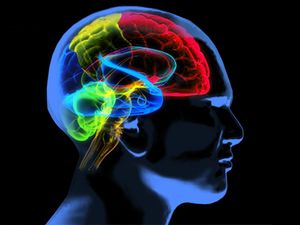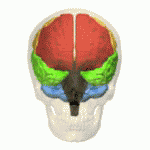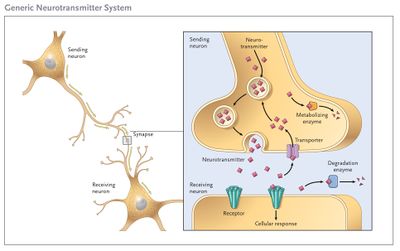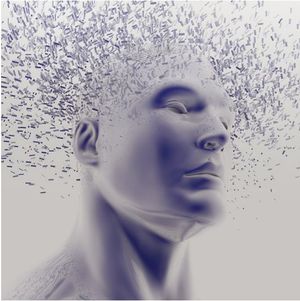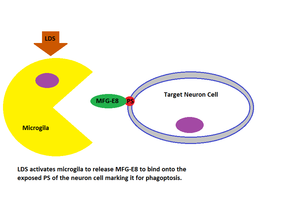Ageing and the Brain: Difference between revisions
Alex Benham (talk | contribs) No edit summary |
Dinu Dixon (talk | contribs) mNo edit summary |
||
| (27 intermediate revisions by 8 users not shown) | |||
| Line 4: | Line 4: | ||
'''Top Contributors''' - {{Special:Contributors/{{FULLPAGENAME}}}} | '''Top Contributors''' - {{Special:Contributors/{{FULLPAGENAME}}}} | ||
<br></div> | |||
< | |||
</div> | |||
== Introduction == | == Introduction == | ||
[[File:Brain .png.jpeg|right|frameless|300x300px]] | |||
[[Brain Anatomy|Brain]] function varies normally as people pass from childhood through adulthood to old age. | |||
* During childhood, the ability to think and reason steadily increases, enabling a child to learn increasingly complex skills. | |||
* During most of adulthood, brain function is relatively stable. | |||
* After a certain age, which varies from person to person, brain function declines<ref name=":0">Kenneth Maiese , MD, National Heart, Lung, and Blood Institute [https://www.msdmanuals.com/en-au/home/brain,-spinal-cord,-and-nerve-disorders/biology-of-the-nervous-system/effects-of-aging-on-the-nervous-system Effects of Aging on the Nervous System] | |||
Last full review/revision Mar 2021| Content last modified Mar 2021 Available from: https://www.msdmanuals.com/en-au/home/brain,-spinal-cord,-and-nerve-disorders/biology-of-the-nervous-system/effects-of-aging-on-the-nervous-system<nowiki/>(accessed 28.3.2021) | |||
</ref>. | |||
The brain's size, vasculature, and cognition all change as we get older. With age, the brain shrinks and changes occur at all levels, from chemicals to morphology. With age, the risk of stroke, white matter lesions, and dementia increases, as does the severity of memory impairment, as well as changes in neurotransmitter and hormone levels. Physical and mental health may be the best defence against the effects of ageing on the brain. <ref>Peters R. Ageing and the brain. Postgraduate medical journal. 2006 Feb 1;82(964):84-8.</ref> | |||
== Common Age Changes == | |||
Some areas of the brain decrease in size by up to 1% per year in some people but without any loss of function. | |||
* [[Older People - An Introduction|Age-related changes]] in brain structure do not always result in loss of brain function. | |||
* A decrease in brain function with ageing may be the result of numerous factors that include changes in [[Neurotransmitters|neurotransmitter]]<nowiki/>s, [[Neurone|neurones]], toxic substances that accumulate in the brain over time, and [[Genetic Conditions and Inheritance|inherited]] changes. | |||
* Brain shrinkage: Brain volume decreases, particularly in the frontal cortex. | |||
* Nerve cell loss: The brain and spinal c<nowiki/>ord lose nerve cells and weigh | |||
* Short-term [[memory]] and the ability to learn new<nowiki/> material tend to be affected relatively early. | |||
* Verbal abilities, incl<nowiki/>uding vocabulary and word usage, may begin to decline later. | |||
* Intellectual performance (the ability to process information, regardless of speed) is usually maintained if no underlying neurologic or vascular disorders are present. | |||
[[File:Cerebrum animation small2.gif|right|frameless|150x150px]] | |||
'''Morphological changes to the brain with ageing''' | |||
* The volume of the brain, due to neuronal loss, occurs at an approximate reduction of 5% of brain weight, per decade, after the age of 40 <ref>Svennerholm L, Boström K, Jungbjer B. Changes in weight and compositions of major membrane components of human brain during the span of adult human life of Swedes. Acta neuropathologica. 1997 Sep 1;94(4):345-52.</ref>, making some structures more pronounced: eg sulci of the [[Cerebral Cortex|cortex]] become deeper; ventricles becoming more pronounced <ref name=":1" /> | |||
* Deposition of Brown (Lipofuscin) <ref>Ottis P, Koppe K, Onisko B, Dynin I, Arzberger T, Kretzschmar H, Requena JR, Silva CJ, Huston JP, Korth C. Human and rat brain lipofuscin proteome. Proteomics. 2012 Aug;12(15-16):2445-54.</ref> or black (Neuromelanin)<ref>Clewett DV, Lee TH, Greening S, Ponzio A, Margalit E, Mather M. Neuromelanin marks the spot: identifying a locus coeruleus biomarker of cognitive reserve in healthy aging. Neurobiology of aging. 2016 Jan 1;37:117-26.</ref> pigments in the brain results in small discoloured areas due to normal ageing (these are noted more in age-related brain pathologies such as [[Alzheimer's Disease|Alzheimer']]<nowiki/>s). <ref name=":1">Knight J, Nigam Y. Anatomy and physiology of ageing 5: the nervous system. Nursing times. 2017 Jun 1;113(6):55-8.</ref>. | |||
[[File:Neurotransmitter System.jpg|right|frameless|400x400px]] | |||
'''Physiological changes to the brain with ageing''' | |||
* Cerebral blood flow has been shown to decrease by 27% decline over 70 years of age through direct changes in the [[Cardiovascular System|cardiovascular system]] and may be exacerbated through [[Atherosclerosis|blood vessel pathology]] <ref>Chen JJ, Rosas HD, Salat DH. Age-associated reductions in cerebral blood flow are independent from regional atrophy. Neuroimage. 2011 Mar 15;55(2):468-78.</ref>. | |||
* The effectiveness of the [[Blood-Brain Barrier|blood-brain barrier]] is found to be reduced with age and this leads to the increased opportunity for the [[Communicable Diseases|pathogens]] and toxic materials crossing into the brain and the neural structures. Recent work has shown that this is often weakened in the hippocampus first which leads to damage to the area and can result in a cognitive decline to the function of the brain region<ref>Montagne A, Barnes SR, Sweeney MD, Halliday MR, Sagare AP, Zhao Z, Toga AW, Jacobs RE, Liu CY, Amezcua L, Harrington MG. Blood-brain barrier breakdown in the aging human hippocampus. Neuron. 2015 Jan 21;85(2):296-302.</ref>. | |||
* Ageing is also associated with declining production of some [[Neurotransmitters|neurotransmitter]]<nowiki/>s, including noradrenaline, glutamate, dopamine and serotonin. Dopamine modulates motor function and the acquisition of new skills and is also one of the brain’s reward chemicals. The number of dopamine-producing neurons decreases as part of the normal ageing process, and this can adversely affect the ability to learn from past experiences <ref>Mather M. The affective neuroscience of aging. Annual review of psychology. 2016 Jan 4;67.</ref>. | |||
== | {{#ev:youtube|yb3BXRcexBg}} | ||
== The Brains Resilience == | |||
[[File:Traumatic Brain Injury Course Picture.JPG|right|frameless]] | |||
The brain has certain characteristics that help compensate for these losses. | |||
# Redundancy: The brain has more cells than it needs to function normally. Redundancy may help compensate for the loss of nerve cells that occurs with aging and disease. | |||
# Formation of new connections: The brain actively compensates for the age-related decrease in nerve cells by making new connections between the remaining nerve cells. | |||
# Production of new nerve cells: Some areas of the brain may produce new nerve cells, especially after a brain injury or a stroke. These areas include the [[hippocampus]] (involved in the formation and retrieval of memories) and the [[Basal Ganglia|basal ganglia]] (coordinates and smooth out movements). | |||
* People who have had a eg brain injury or stroke, can learn new skills, as occurs during physiotherapy therapy. | |||
* People can influence how quickly brain function declines. eg. physical exercise seems to slow the loss of nerve cells in areas of the brain involved in memory. Such exercise also helps keep the remaining nerve cells functioning. On the other hand, consuming two or more drinks of alcohol a day can speed the decline in brain function<ref name=":0" />. | |||
''' | == '''Brain Workouts''' == | ||
[[File:Strengthing exercise for old people .jpg|right|frameless]] | |||
Aging brains remain somewhat malleable and plastic. [[Neuroplasticity|Plasticity]] refers to the ability to flexibly recruit different areas of the brain to do different jobs. | |||
* In contrast to the earlier, largely pessimistic view of ageing, neuroimaging studies suggest ageing brains can reorganize and change, and not necessarily for the worse. | |||
* Older brains’ plasticity suggests they could benefit from training programs and engaging, immersive experiences eg learning new skills, physical exercise, cognitive regimens and engaged, social lifestyles. <ref>The Conversation Aging brains aren’t necessarily declining brains | |||
Available from:https://theconversation.com/aging-brains-arent-necessarily-declining-brains-33574 (accessed 28.3.2021) | |||
</ref> | |||
''' | == '''Neuroinflammation''' == | ||
[[File:Microglia phagoptosis of neuron cell.png|right|frameless]] | |||
Research within the past 30 years has identified that ageing affects the immune function within the central nervous system (CNS).<ref>Fenn AM, Norden DM, Godbout JP. Neuroinflammation in Aging. Neuroinflammation. 2015 Mar 10:87-105.Available from: https://onlinelibrary.wiley.com/doi/abs/10.1002/9781118732748.ch6<nowiki/>(accessed 28.3.2021)</ref> Ageing is characterized by the development of persistent pro-inflammatory responses that contribute to atherosclerosis, metabolic syndrome, cancer and frailty. | |||
The ageing brain is vulnerable to inflammation, as demonstrated by the high prevalence of eg age-associated cognitive decline. | |||
* Systemically, circulating pro-inflammatory factors can promote cognitive decline, and in the brain, [[Glial Cells|microglia]] lose the ability to clear [[Prion Diseases (or Transmissible Spongiform Encephalopathies)|misfolded proteins]] that are associated with [[Neurodegenerative Disease|neurodegeneration]]<ref name=":2">Minhas PS, Latif-Hernandez A, McReynolds MR, Durairaj AS, Wang Q, Rubin A, Joshi AU, He JQ, Gauba E, Liu L, Wang C. [https://www.nature.com/articles/s41586-020-03160-0 Restoring metabolism of myeloid cells reverses cognitive decline in ageing]. Nature. 2021 Feb;590(7844):122-8.Available from: https://www.nature.com/articles/s41586-020-03160-0 (accessed28.3.2021)</ref> | |||
= | * Aging brains also have an increased number of activated microglia, a sign of activated immune system response<ref>news medical Neuroinflammation Available from:https://www.news-medical.net/life-sciences/What-are-the-Types-of-Neuroinflammation.aspx (accessed 28.3.2021)</ref>, Microglia act as the brain's resident cleanup squad by phagocytosing apoptotic cells, plaques, and pathogens | ||
* [[Immune System|Immune cells]] called macrophages have been found to shut down major metabolic pathways during ageing. Restoring metabolism in these cells is sufficient to alleviate age-associated cognitive decline in mice. It is hoped these findings will help develop new ways of restoring migroglial function in humans.<ref name=":2" /> | |||
* Research has shown that a healthy but ageing brain has chronically increased levels of pro-inflammatory cytokines and reduced levels of anti-inflammatory [[Cytokines|cytokine]]<nowiki/>s. | |||
[[File:Fish.jpeg|right|frameless]] | |||
'''Diet and Neuroinflammation:''' Anti-inflammatory dietary patterns eg Mediterranean diet and dietary approaches to stop hypertension (DASH) may be neuroprotective. | |||
* Several dietary components consumed in the MD and DASH (omega-3 fatty acids, [[Free Radicals|antioxidants]] and polyphenols) can inhibit neuroinflammation associated with [[Alzheimer's Disease|AD]]. | |||
* Anti-inflammatory diets may also attenuate neuroinflammation via indirect immune pathways from the gut [[Gut Brain Axis (GBA)|microbiome]] and systemic circulation. | |||
* Diet may influence cognitive ageing via several inflammatory pathways<ref>McGrattan AM, McGuinness B, McKinley MC, Kee F, Passmore P, Woodside JV, McEvoy CT. [https://pubmed.ncbi.nlm.nih.gov/30949921/ Diet and inflammation in cognitive ageing and Alzheimer’s disease.] Current nutrition reports. 2019 Jun 1;8(2):53-65. Available from:https://pubmed.ncbi.nlm.nih.gov/30949921/ (accessed 28.3.2021)</ref> | |||
== References == | == References == | ||
| Line 40: | Line 77: | ||
[[Category:Physiology]] | [[Category:Physiology]] | ||
[[Category:Spinal Cord - Anatomy]] | [[Category:Spinal Cord - Anatomy]] | ||
Latest revision as of 23:11, 13 November 2023
Original Editor - Created as part of the AGILE Project
Top Contributors - Alex Benham, Simisola Ajeyalemi, Kim Jackson, Lucinda hampton, Rubi, Rishika Babburu, Claire Knott, Tolulope Adeniji, Sai Kripa and Dinu Dixon
Introduction[edit | edit source]
Brain function varies normally as people pass from childhood through adulthood to old age.
- During childhood, the ability to think and reason steadily increases, enabling a child to learn increasingly complex skills.
- During most of adulthood, brain function is relatively stable.
- After a certain age, which varies from person to person, brain function declines[1].
The brain's size, vasculature, and cognition all change as we get older. With age, the brain shrinks and changes occur at all levels, from chemicals to morphology. With age, the risk of stroke, white matter lesions, and dementia increases, as does the severity of memory impairment, as well as changes in neurotransmitter and hormone levels. Physical and mental health may be the best defence against the effects of ageing on the brain. [2]
Common Age Changes[edit | edit source]
Some areas of the brain decrease in size by up to 1% per year in some people but without any loss of function.
- Age-related changes in brain structure do not always result in loss of brain function.
- A decrease in brain function with ageing may be the result of numerous factors that include changes in neurotransmitters, neurones, toxic substances that accumulate in the brain over time, and inherited changes.
- Brain shrinkage: Brain volume decreases, particularly in the frontal cortex.
- Nerve cell loss: The brain and spinal cord lose nerve cells and weigh
- Short-term memory and the ability to learn new material tend to be affected relatively early.
- Verbal abilities, including vocabulary and word usage, may begin to decline later.
- Intellectual performance (the ability to process information, regardless of speed) is usually maintained if no underlying neurologic or vascular disorders are present.
Morphological changes to the brain with ageing
- The volume of the brain, due to neuronal loss, occurs at an approximate reduction of 5% of brain weight, per decade, after the age of 40 [3], making some structures more pronounced: eg sulci of the cortex become deeper; ventricles becoming more pronounced [4]
- Deposition of Brown (Lipofuscin) [5] or black (Neuromelanin)[6] pigments in the brain results in small discoloured areas due to normal ageing (these are noted more in age-related brain pathologies such as Alzheimer's). [4].
Physiological changes to the brain with ageing
- Cerebral blood flow has been shown to decrease by 27% decline over 70 years of age through direct changes in the cardiovascular system and may be exacerbated through blood vessel pathology [7].
- The effectiveness of the blood-brain barrier is found to be reduced with age and this leads to the increased opportunity for the pathogens and toxic materials crossing into the brain and the neural structures. Recent work has shown that this is often weakened in the hippocampus first which leads to damage to the area and can result in a cognitive decline to the function of the brain region[8].
- Ageing is also associated with declining production of some neurotransmitters, including noradrenaline, glutamate, dopamine and serotonin. Dopamine modulates motor function and the acquisition of new skills and is also one of the brain’s reward chemicals. The number of dopamine-producing neurons decreases as part of the normal ageing process, and this can adversely affect the ability to learn from past experiences [9].
The Brains Resilience[edit | edit source]
The brain has certain characteristics that help compensate for these losses.
- Redundancy: The brain has more cells than it needs to function normally. Redundancy may help compensate for the loss of nerve cells that occurs with aging and disease.
- Formation of new connections: The brain actively compensates for the age-related decrease in nerve cells by making new connections between the remaining nerve cells.
- Production of new nerve cells: Some areas of the brain may produce new nerve cells, especially after a brain injury or a stroke. These areas include the hippocampus (involved in the formation and retrieval of memories) and the basal ganglia (coordinates and smooth out movements).
- People who have had a eg brain injury or stroke, can learn new skills, as occurs during physiotherapy therapy.
- People can influence how quickly brain function declines. eg. physical exercise seems to slow the loss of nerve cells in areas of the brain involved in memory. Such exercise also helps keep the remaining nerve cells functioning. On the other hand, consuming two or more drinks of alcohol a day can speed the decline in brain function[1].
Brain Workouts[edit | edit source]
Aging brains remain somewhat malleable and plastic. Plasticity refers to the ability to flexibly recruit different areas of the brain to do different jobs.
- In contrast to the earlier, largely pessimistic view of ageing, neuroimaging studies suggest ageing brains can reorganize and change, and not necessarily for the worse.
- Older brains’ plasticity suggests they could benefit from training programs and engaging, immersive experiences eg learning new skills, physical exercise, cognitive regimens and engaged, social lifestyles. [10]
Neuroinflammation[edit | edit source]
Research within the past 30 years has identified that ageing affects the immune function within the central nervous system (CNS).[11] Ageing is characterized by the development of persistent pro-inflammatory responses that contribute to atherosclerosis, metabolic syndrome, cancer and frailty.
The ageing brain is vulnerable to inflammation, as demonstrated by the high prevalence of eg age-associated cognitive decline.
- Systemically, circulating pro-inflammatory factors can promote cognitive decline, and in the brain, microglia lose the ability to clear misfolded proteins that are associated with neurodegeneration[12]
- Aging brains also have an increased number of activated microglia, a sign of activated immune system response[13], Microglia act as the brain's resident cleanup squad by phagocytosing apoptotic cells, plaques, and pathogens
- Immune cells called macrophages have been found to shut down major metabolic pathways during ageing. Restoring metabolism in these cells is sufficient to alleviate age-associated cognitive decline in mice. It is hoped these findings will help develop new ways of restoring migroglial function in humans.[12]
- Research has shown that a healthy but ageing brain has chronically increased levels of pro-inflammatory cytokines and reduced levels of anti-inflammatory cytokines.
Diet and Neuroinflammation: Anti-inflammatory dietary patterns eg Mediterranean diet and dietary approaches to stop hypertension (DASH) may be neuroprotective.
- Several dietary components consumed in the MD and DASH (omega-3 fatty acids, antioxidants and polyphenols) can inhibit neuroinflammation associated with AD.
- Anti-inflammatory diets may also attenuate neuroinflammation via indirect immune pathways from the gut microbiome and systemic circulation.
- Diet may influence cognitive ageing via several inflammatory pathways[14]
References[edit | edit source]
- ↑ 1.0 1.1 Kenneth Maiese , MD, National Heart, Lung, and Blood Institute Effects of Aging on the Nervous System Last full review/revision Mar 2021| Content last modified Mar 2021 Available from: https://www.msdmanuals.com/en-au/home/brain,-spinal-cord,-and-nerve-disorders/biology-of-the-nervous-system/effects-of-aging-on-the-nervous-system(accessed 28.3.2021)
- ↑ Peters R. Ageing and the brain. Postgraduate medical journal. 2006 Feb 1;82(964):84-8.
- ↑ Svennerholm L, Boström K, Jungbjer B. Changes in weight and compositions of major membrane components of human brain during the span of adult human life of Swedes. Acta neuropathologica. 1997 Sep 1;94(4):345-52.
- ↑ 4.0 4.1 Knight J, Nigam Y. Anatomy and physiology of ageing 5: the nervous system. Nursing times. 2017 Jun 1;113(6):55-8.
- ↑ Ottis P, Koppe K, Onisko B, Dynin I, Arzberger T, Kretzschmar H, Requena JR, Silva CJ, Huston JP, Korth C. Human and rat brain lipofuscin proteome. Proteomics. 2012 Aug;12(15-16):2445-54.
- ↑ Clewett DV, Lee TH, Greening S, Ponzio A, Margalit E, Mather M. Neuromelanin marks the spot: identifying a locus coeruleus biomarker of cognitive reserve in healthy aging. Neurobiology of aging. 2016 Jan 1;37:117-26.
- ↑ Chen JJ, Rosas HD, Salat DH. Age-associated reductions in cerebral blood flow are independent from regional atrophy. Neuroimage. 2011 Mar 15;55(2):468-78.
- ↑ Montagne A, Barnes SR, Sweeney MD, Halliday MR, Sagare AP, Zhao Z, Toga AW, Jacobs RE, Liu CY, Amezcua L, Harrington MG. Blood-brain barrier breakdown in the aging human hippocampus. Neuron. 2015 Jan 21;85(2):296-302.
- ↑ Mather M. The affective neuroscience of aging. Annual review of psychology. 2016 Jan 4;67.
- ↑ The Conversation Aging brains aren’t necessarily declining brains Available from:https://theconversation.com/aging-brains-arent-necessarily-declining-brains-33574 (accessed 28.3.2021)
- ↑ Fenn AM, Norden DM, Godbout JP. Neuroinflammation in Aging. Neuroinflammation. 2015 Mar 10:87-105.Available from: https://onlinelibrary.wiley.com/doi/abs/10.1002/9781118732748.ch6(accessed 28.3.2021)
- ↑ 12.0 12.1 Minhas PS, Latif-Hernandez A, McReynolds MR, Durairaj AS, Wang Q, Rubin A, Joshi AU, He JQ, Gauba E, Liu L, Wang C. Restoring metabolism of myeloid cells reverses cognitive decline in ageing. Nature. 2021 Feb;590(7844):122-8.Available from: https://www.nature.com/articles/s41586-020-03160-0 (accessed28.3.2021)
- ↑ news medical Neuroinflammation Available from:https://www.news-medical.net/life-sciences/What-are-the-Types-of-Neuroinflammation.aspx (accessed 28.3.2021)
- ↑ McGrattan AM, McGuinness B, McKinley MC, Kee F, Passmore P, Woodside JV, McEvoy CT. Diet and inflammation in cognitive ageing and Alzheimer’s disease. Current nutrition reports. 2019 Jun 1;8(2):53-65. Available from:https://pubmed.ncbi.nlm.nih.gov/30949921/ (accessed 28.3.2021)
